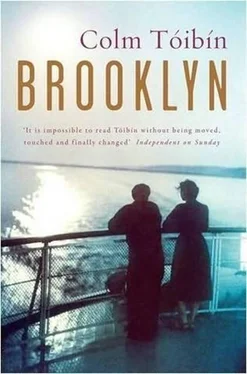She did not expect to see so many people from Enniscorthy in the dancehall. Many of the dancers seemed to know that Nancy and George were soon to be married and they were congratulated as they moved around the hall. Jim, Eilis noticed, had a way of nodding at people, acknowledging simply that he recognized them. It was not unfriendly, nor was it an invitation to approach him. He seemed to her more severe than George, who was all smiles, and she wondered if that came from running a pub, knowing who many people were and managing at the same time to stand apart from them.
She danced with Jim all night except when George and Jim switched partners and then only briefly. She knew that she was being watched and commented on by people from the town, especially when the tempo of the music was fast and it was clear that she and Jim were good dancers, but also later, when the lights went down and the music was slow and they danced close to each other.
Outside, when the dance was over, the night was still warm. Jim and she let George and Nancy walk ahead of them towards the car and told them they would join them soon. All day Jim had behaved impeccably: he had not bored or irritated her, or pressed himself too much on her; he seemed immensely considerate, funny at times, willing to be silent, polite as well. He also stood out in the dancehall, where some were drunk or others were too old or looked as though they had travelled to Courtown on tractors. He was handsome, graceful, smart, and, as the night wore on, she was proud to be with him. Now, they found a space in between a guest house and a new bungalow and began to kiss. Jim moved slowly; at intervals he held her head in his hands so that he could look at her eyes in the semi-darkness and kiss her passionately. The feel of his tongue in her mouth made her respond to him with ease at first and then with something close to real excitement.
In the car on the way back to Enniscorthy, as they sat together in the back seat, they tried to disguise what they were doing but eventually gave up, causing much laughter on the part of Nancy and George.
On Monday morning, when there was a message for Eilis to come down to Davis 's, she presumed that it meant they wanted to pay her. When she turned up, she found Maria Gethings waiting for her once more.
"Mr. Brown wants to see you," Maria said. "I'll check if he has anyone with him now."
Mr. Brown had been Rose's boss and was one of the owners of the mill. Eilis knew he came from Scotland and had often seen him driving in a very large and shiny car. She had noticed the awe in Maria's voice when she mentioned his name. After a short time, Maria returned and said that he would see Eilis immediately. She ushered Eilis down a corridor and into a room at the end. Mr. Brown was sitting in a high leather chair behind a long desk.
"Miss Lacey," he said, standing up and leaning across the desk to shake Eilis's hand. "I wrote to your mother when poor Rose died and we were very cut up and I wondered if I should have called as well. And I am told you are home from America and Maria tells me that you have a certificate in bookkeeping. Is it American bookkeeping?"
Eilis explained that she did not think there was any great difference between the two systems.
"I don't suppose there is," Mr. Brown said. "Anyway, Maria was very happy with how you did the wages last week, but we were not surprised, of course, you being Rose's sister. Rose was the essence of efficiency and is much missed."
"Rose was a great example to me," Eilis said.
"Until the busy season is over," Mr. Brown went on, "it will be hard for us to know how we are fixed in the office, but we may certainly need a bookkeeper and someone familiar with how the wages are paid in the long term. But we would like you to continue with the wages on a part-time basis and then we can speak to you in a while."
"I will be going back to the United States," Eilis said.
"Well, yes, of course," Mr. Brown said. "But you and I will speak again before you make any firm decisions."
Eilis was about to say that she had already made a firm decision, but since Mr. Brown's tone suggested that he did not need just now to have any further discussion on the matter, she realized that she was not expected to reply. Instead, she stood up, and Mr. Brown did too, accompanying her to the door and sending his regards to her mother before he saw her out to the care of Maria Gethings, who had an envelope for her ready with cash inside.
That evening Eilis had promised to go to Nancy 's house to look at the list of people invited to the wedding breakfast and work out with her where they should be seated. She recounted her interview with Mr. Brown with puzzlement.
"Two years ago," she said, "he wouldn't even see me. I know that Rose asked him if there was any possibility of a job for me and he just said no. Just no."
"Well, things have changed."
"And two years ago Jim Farrell seemed to think it was his duty to ignore me in the Athenaeum even though George had practically asked him to dance with me."
"You have changed," Nancy said. "You look different. Everything about you is different, not for those who know you, but for people in the town who only know you to see."
"What's changed?"
"You seem more grown up and serious. And in your American clothes you look different. You have an air about you. Jim can't stop trying to get us to find more excuses to go out together."
Later, as Eilis had a cup of tea with her mother before they went to bed, her mother reminded her that she knew the Farrells, although she had not been in the house, which was over the pub, for years.
"You don't notice it much from outside," she said, "but it is one of the nicest houses in the town. The two rooms upstairs have double doors between them and I remember even years ago people used to comment on how large it was. And I hear that the parents are moving out to Glenbrien where she's from, to a house that her aunt left her. The father loves horses, he's a great man for the races, and he is going to have horses out there, or so I heard. And Jim is getting the whole place."
"He'll miss them so," Eilis said. "Because they run the pub when he wants to go out."
"Oh, it'll be all very gradual, I'd say," her mother replied.
Upstairs on the bed Eilis found two letters from Tony and she realized, almost with a start, that she had not written to him as she had intended. She looked at the two envelopes, at his handwriting, and she stood in the room with the door closed wondering how strange it was that everything about him seemed remote. And not only that, but everything else that had happened in Brooklyn seemed as though it had almost dissolved and was no longer richly present for her-her room in Mrs. Kehoe's, for example, or her exams, or the trolley-car from Brooklyn College back home, or the dancehall, or the apartment where Tony lived with his parents and his three brothers, or the shop floor at Bartocci's. She went through all of it as though she were trying to recover what had seemed so filled with detail, so solid, just a few weeks before.
She put the letters on the chest of drawers and decided that she would reply when she returned from Dublin the following evening. She would tell Tony about all the preparations for Nancy 's wedding, the outfits that she and her mother had bought. She might even tell him about her interview with Mr. Brown and how she had informed him that she would be returning to Brooklyn. She would write as though she had not yet received these two letters and she would not open them now, she thought, but wait until she had written her own letter.
The idea that she would leave all of this-the rooms of the house once more familiar and warm and comforting-and go back to Brooklyn and not return for a long time again frightened her now. She knew as she sat on the edge of the bed and took her shoes off and then lay back with her arms behind her head that she had spent every day putting off all thought of her departure and what she would meet on her arrival.
Читать дальше












